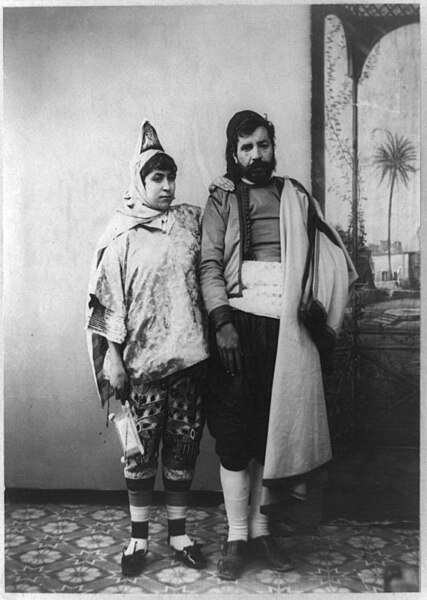History of the Jews in Tunisia
The history of the Jews in Tunisia extends nearly two thousand years to the Punic era. The Jewish community in Tunisia is no doubt older and grew up following successive waves of immigration and proselytism before its development was hampered by anti-Jewish measures in the Byzantine Empire. The community formerly used its own dialect of Arabic. After the Muslim conquest of Tunisia, Tunisian Judaism went through periods of relative freedom or even cultural apogee to times of more marked discrimination. The arrival of Jews expelled from the Iberian peninsula, often through Livorno, greatly altered the country. Its economic, social and cultural situation has improved markedly with the advent of the French protectorate before being compromised during the Second World War, with the occupation of the country by the Axis. The Nakba and the creation of Israel in 1948 provoked a widespread anti-Zionist reaction in the Arab world, to which was added nationalist agitation, nationalization of enterprises, Arabization of education and part of the administration. Jews left Tunisia en masse from the 1950s onwards because of the problems raised and the hostile climate created by the Bizerte crisis in 1961 and the Six-Day War in 1967. According to the Jewish Virtual Library, the Jewish population of Tunisia, was estimated at about 105,000 individuals in 1948. These Jews lived mainly in Tunis, with communities present in Djerba. The 2022 Report on International Religious Freedom by The U.S Department of State stated that "according to members of the Jewish community, there are approximately 1,500 Jewish citizens in the country".

Jews of Tunis, c. 1900
Jewish couple in Tunisia, c. 1900
View of Jerusalem and the Temple of Solomon by Hartmann Schedel
Tertullian who fought against the expansion of Judaism
French protectorate of Tunisia
The French protectorate of Tunisia, officially the Regency of Tunis and commonly referred to as simply French Tunisia, was established in 1881, during the French colonial empire era, and lasted until Tunisian independence in 1956.
Portrait of the Bey Muhammad III Sadiq.
Tunisia in 1843.
The Congress of Berlin by Anton von Werner.
Benedetto Cairoli, the Prime Minister who suffered the slap of Tunis and had to resign from his office.








